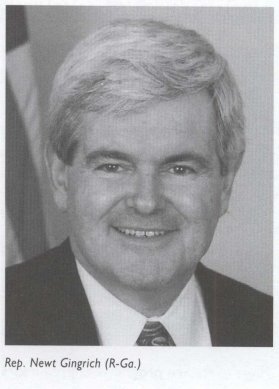Politics of Denial: Congress
Gingrich Rallies the Troops

Congressional Republicans convened on Capitol Hill on April 30 armed and ready with a script. The gathering was a "Deployment Ceremony" to launch an eight-week campaign of the Speaker's Task Force for a Drug-Free America. Without a hint of irony,
the Republican's official talking points declared that this was "not a war of words, but a war of action." House Speaker Newt Gingrich established the 32-member Task Force on March 24 "to design a World War II-style victory plan to save America's children from drugs." Its stated goal is to advance a "comprehensive strategy to achieve a drug-free America by 2002," but the Republicans also have their eye on the mid-term elections. In an effort to appear tougher on drugs than President Clinton, they assembled the task force to "recommit" the nation to waging a vigorous war on drugs.
The Washington Post reporter who obtained the Republican talking points predicted that syringes would be used as props at the "Deployment Ceremony." And aides were told to describe the drug problem as an "epidemic" or "crisis," and to "mobilize" and "conquer" the "scourge" of drugs.
The rhetoric is familiar, but the Gingrich plan calls for an unprecedented 80 percent reduction in the flow of drugs into the United States and a 50 percent reduction in illicit drug use by 2002. It is a lofty if not impossible target, but the Task Force is betting that more police, mandatory prison sentences, and indiscriminate drug testing will move America in that direction.
The Task Force's legislative agenda is comprised of a bewildering collection of punitive measures that begin with the words "drug-free" (see table on p. 11). There is the "Drug-Free Student Loan Amendment," the "Drug-Free Workplace Act," the "Drug-Free Money Laundering Act," the "Drug-Free Prisons and Jails Act," the "Drug-Free Borders Act," and the "Drug-Free Hemisphere Act." Plus the "Drug-Free America Blue Ribbon Campaign Resolution," which would declare September 13 - 19, 1998, to be Blue
Ribbon Week so Americans can "visibly express their commitment to win the war on drugs by 2002."
Senate Republicans, with little opposition from their Democratic colleagues, also tried to get into the drug-free act this year by tapping the perfect cash cow — the National Tobacco Settlement Trust Fund. Sen. Paul Coverdell (R-Ga.) introduced an amendment to the Senate tobacco bill (S. 1415) that would have used $1.87 billion a year until 2003 from the Fund to pay for more police, military, and drug testing as well as the newest innovation in drug policy — a computerized registry of convicted drug traffickers. The amendment was adopted on June 9.
The tobacco bill was not to be, however. On June 17, the bill met its demise when the Senate voted to end the floor debate and send the bill back to committee. But even if the provisions contained in the Coverdell amendment did not become law, they are indicative of most politicians' thinking on the matter of drug policy: Spend more money for more of the same. If arresting and imprisoning millions of people for violating the drug laws has not created a drug-free America, then we need to imprison a few million more.
Passage of the entire Republican legislative package seems unlikely. With the hard press of the congressional schedule and the upcoming mid-term elections, it will be difficult for Republicans to push through their revamped seek-find-prosecute-punish agenda. However, a few of these proposals may eventually make their way to the president's desk — where they undoubtedly will be signed into law. Even if Republicans do not get everything they want, their latest bit of posturing threatens to put more non-
violent drug offenders behind bars, marginalize more young people who experiment with drugs, and further erode what remains of Americans' civil liberties.
|























